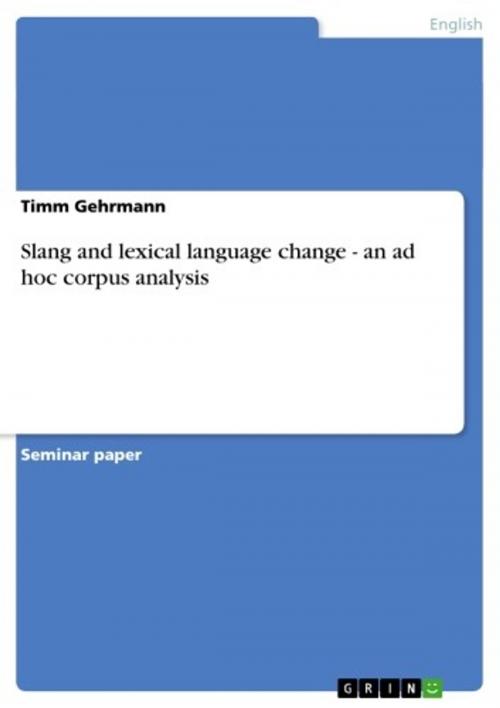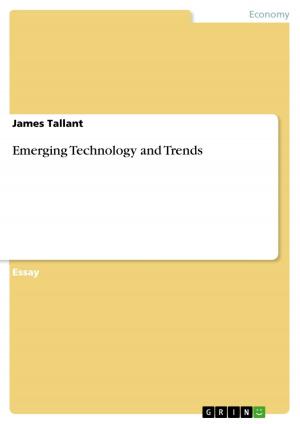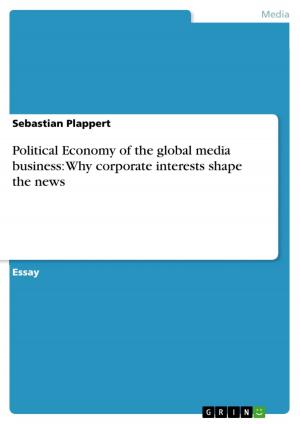Slang and lexical language change - an ad hoc corpus analysis
an ad hoc corpus analysis
Nonfiction, Entertainment, Drama, Anthologies| Author: | Timm Gehrmann | ISBN: | 9783638873390 |
| Publisher: | GRIN Publishing | Publication: | December 10, 2007 |
| Imprint: | GRIN Publishing | Language: | English |
| Author: | Timm Gehrmann |
| ISBN: | 9783638873390 |
| Publisher: | GRIN Publishing |
| Publication: | December 10, 2007 |
| Imprint: | GRIN Publishing |
| Language: | English |
Seminar paper from the year 2007 in the subject English Language and Literature Studies - Linguistics, grade: 2,7, University of Wuppertal, course: 18th and 19th century English, 25 entries in the bibliography, language: English, abstract: The study of slang and unconventional English has so far been rather of popular than academic interest, yet there are several publications mostly in the form of dictionaries which deal with slang in an academic way1. Yet slang proves to be a source of new vocabulary and often reflects social and cultural changes2 and the study of slang or unconventional English may reveal the ways in which a language is going to develop in the future because slang is of very high productivity and presents 'the most powerful of all the stimulants that keep language alive and growing'3. In order to show how slang and colloquial language affects a standard language, I thought that a synchronic comparison of the lexicon of a language through corpora may prove to be of high value, which is why I have taken this approach. In this small-scale scientific research paper I will compare a random choice of lexical items from different editions of dictionaries of British and American slang with a corpus compiled by myself making use of plublicly available Internet resources. The corpus I have compiled was a random choice of news articles from all areas (Politics, Science, Sports...) from the on-line editions of the British newspapers 'The Guardian', 'The Sun' and 'The Observer' and of the American newspapers 'USA Today' and 'The New York Times'. A random choice of material is supposed to be of high value in so far as it does not lead to a concentration on certain aspects of speech and is more 'readily achievable'4. By examining whether slang expressions have made their way into the standard language of mainstream English language newspapers I will be able to show in how far slang makes its way into the two most important standard dialects of English, thus showing how innovative slang proves to be and in how far slang is incorporated into the standard language. I hope to be able to show that it is quite common that lexical items or expressions that used to be regarded as slang or 'bad English' can make their way into a standard dialect and become socially accepted and that they are not 'saboteurs of value' and imperile English as a medium of conversation5. Thus slang or what can often be called the language of the lower classes (it may even be argued that slang is a derogative of expressions that do not fit the middle class pattern of speech) has often been subjected to criticism by those who see the language as '[...] a medium of exchange whose values must be kept fixed, as far as possible, like those of any other reliable currency' in order to prevent language change through the '[...] low, iliterate and unthinking mob'6.
Seminar paper from the year 2007 in the subject English Language and Literature Studies - Linguistics, grade: 2,7, University of Wuppertal, course: 18th and 19th century English, 25 entries in the bibliography, language: English, abstract: The study of slang and unconventional English has so far been rather of popular than academic interest, yet there are several publications mostly in the form of dictionaries which deal with slang in an academic way1. Yet slang proves to be a source of new vocabulary and often reflects social and cultural changes2 and the study of slang or unconventional English may reveal the ways in which a language is going to develop in the future because slang is of very high productivity and presents 'the most powerful of all the stimulants that keep language alive and growing'3. In order to show how slang and colloquial language affects a standard language, I thought that a synchronic comparison of the lexicon of a language through corpora may prove to be of high value, which is why I have taken this approach. In this small-scale scientific research paper I will compare a random choice of lexical items from different editions of dictionaries of British and American slang with a corpus compiled by myself making use of plublicly available Internet resources. The corpus I have compiled was a random choice of news articles from all areas (Politics, Science, Sports...) from the on-line editions of the British newspapers 'The Guardian', 'The Sun' and 'The Observer' and of the American newspapers 'USA Today' and 'The New York Times'. A random choice of material is supposed to be of high value in so far as it does not lead to a concentration on certain aspects of speech and is more 'readily achievable'4. By examining whether slang expressions have made their way into the standard language of mainstream English language newspapers I will be able to show in how far slang makes its way into the two most important standard dialects of English, thus showing how innovative slang proves to be and in how far slang is incorporated into the standard language. I hope to be able to show that it is quite common that lexical items or expressions that used to be regarded as slang or 'bad English' can make their way into a standard dialect and become socially accepted and that they are not 'saboteurs of value' and imperile English as a medium of conversation5. Thus slang or what can often be called the language of the lower classes (it may even be argued that slang is a derogative of expressions that do not fit the middle class pattern of speech) has often been subjected to criticism by those who see the language as '[...] a medium of exchange whose values must be kept fixed, as far as possible, like those of any other reliable currency' in order to prevent language change through the '[...] low, iliterate and unthinking mob'6.















